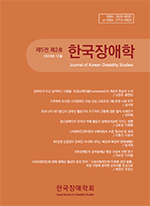본 연구는 정신장애인의 온라인 카페활동이 장애정체감에 어떠한 영향을 미치는지 알아보고자 하였다. 이를 통해 정신장애인이 온라인 카페 속에서 형성한 장애정체감이 온라인에서뿐만 아니라 현실 공간에서까지 이어지고, 장애문화로 확장될 수 있도록 함의를 제시하는 데 목적을 두었다. 본 연구를 위해 정신장애인 카페에서 활동하고 있는 당사자 103명이 설문에 참여하였고 결과를 분석하였다. 그 결과, 정신장애인의 온라인 카페활동이 장애정체감에 유의미한 영향을 미쳤고, 그 외 다른 일반적 특성은 영향을 미치지 않았다. 이는 정신장애인의 장애정체감은 일반적 특성보다 장애로 인한 경험을 공유하고 소통하는 것이 더 중요하다고 볼 수 있다. 따라서 정신장애인의 장애정체감 형성이 온라인 카페활동에서 동력을 얻을 수 있도록 해야 하겠다. 또한 온라인의 활동이 오프라인 활동으로 확장되어 장애문화를 생산해내는 역할을 할 수 있도록 정신장애인의 온라인 카페활동에 대한 지속적인 논의가 필요하겠다.
The purpose of this study was to investigate the effect of online cafe activities of persons with mental disabilities on disability identity. Through this, the purpose of this study was to suggest implications so that the disability identity that the persons with mental disabilities have formed in the online cafe can be extended not only online but also in real space, and expand to a culture of disability. For this study, 103 people who are active in cafes with persons with mental disabilities participated in the questionnaire and analyzed the results. As a result, online cafe activity of persons with mental disabilities have significantly affected disability congestion, and other general characteristics have not. This can be seen as more important to share and communicate experiences caused by disabilities than general characteristics. Therefore, the formation of disability identity of mentally impaired people should be able to gain momentum from online cafe activities. In addition, there is a need for continuous discussion on online cafe activities of persons with mental disabilities so that online activities can be expanded to offline activities and play a role in creating a culture of disabilities.
1. 서 론
2. 선행연구의 검토
3. 연구방법
4. 연구결과
5. 결론 및 함의
참고문헌
(0)
(0)
